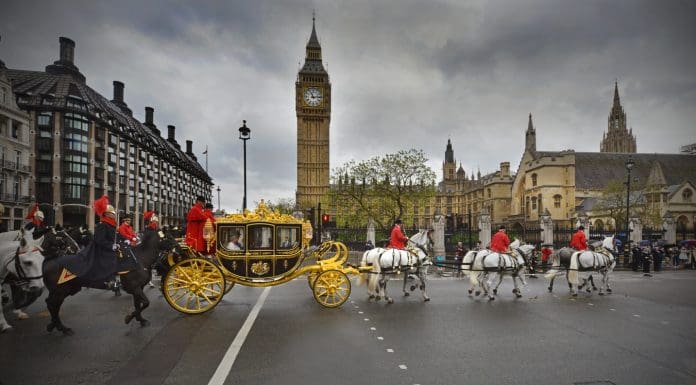Prime minister Keir Starmer placed the economy at the forefront of his first King’s Speech today, with policy reforms geared towards encouraging growth
Labour’s first King’s Speech in over 15 years detailed plans for devolution, renationalisation of the railways and more public-owned bus networks.
Driving economic growth was the clear focus of the speech, with long-held party promises such as lowering the voting age to 16 put on the back burner for now.
Other non-economic policies announced included resurrecting Rishi Sunak’s phased smoking ban, introducing an age of retirement at 80 for the House of Lords, a revised version of the Renters Reform Bill and new legislation regulating AI.
Key announcements from the 2024 King’s Speech include:
Establishing a new national body in Great British Energy
The state-owned entity will oversee investment in large energy projects to accelerate the energy transition. The new Government has already marked a sea change in the sector, with energy secretary Ed Miliband recently imposing a ban on North Sea oil and overturning the Conservative’s embargo on onshore wind.
CPRE’s Elli Moody said: “The climate emergency is the biggest threat facing our countryside. We need a rapid transition to renewables.
“Properly planned onshore wind has an important role to play in the urgent decarbonisation of our energy system. New onshore wind developments must be strategically located away from sensitive landscapes and involve local communities in a transparent engagement process.
“We now need to see the government support onshore wind in cases where landscape sensitivity is considered and proposals have the backing of the local community. If the will is there, we can protect our valued landscapes and meet our nation’s energy needs at the same time.
“Many communities may wish to host onshore windfarms. We need to back them by offering community ownership as standard.
“We will continue to call on the government to unleash the potential of rooftop solar to protect more countryside for food, nature and wellbeing.
“We call on the government to ensure that 40GW of the national solar target of 70GW is delivered from rooftop solar by 2035.”
Reinstating mandatory housing targets on local authorities
Former housing secretary Michael Gove relaxed these rules last year, to a lukewarm response from the industry. Pending a consultation to determine the exact figures, the Government intends to have the targets in place by autumn of this year.
Relaxing planning rules to boost building
Honor Barratt, CEO of Birchgrove, for anything you may be running on Labour’s proposals in the King’s Speech later today: “Labour’s plan to increase the annual supply of new homes is commendable, but we can be making far more effective use of homes already built.”
“Two thirds of over-65s have at least two empty spare bedrooms in their home, which equates to nine million empty bedrooms every night. Meanwhile, we have 300,000 people who are technically homeless – either sofa surfing or on the streets.
“Investing specifically in senior living housing will help more over-65s downsize, thereby freeing up millions of bedrooms and reducing the need to develop on greenbelt land. We already have enough homes between us; there is just a massive imbalance in how we live in them.”
CPRE director of policy, campaigns and communications Elli Moody said: “We welcome Labour’s ambition to build the homes we urgently need. However, they should start with the 1.2m new homes that could be built on shovel-ready brownfield sites in England alone.
“The Green Belt is the countryside next door for 30m people in the UK and has huge benefits for food security, physical and mental health, and nature restoration. Protections for it must be maintained in the policy framework.
“New homes on the Green Belt have rarely been genuinely affordable and create car-dependent communities far from public transport networks and other essential infrastructure.
“We also need to see ambitious targets in policy for genuinely affordable and social homes close to where people already live, work and go to school. The definition of ‘affordable’ housing should be changed to reflect local incomes rather than market rates.
“The government should deliver a strategic land-use framework that makes the best use of our finite supply of land and safeguards the Green Belt for future generations.
“We support Labour’s focus on plan-led development. We would like to see Local Plans include ambitious net zero and environmental targets.”
Others argued that planning delays were not the only obstacle to delivering housing
Danny Sutcliffe, founding partner at leading UK housing regeneration and development consultancy, Red Loft, commented: “The principal barrier to development is not legislation or the planning system but funding.
“Making new schemes stack up financially has become increasingly difficult as a result of labour and materials shortages alongside the rise in borrowing rates.
“Since 1949 the private sector has delivered between 150,000-200,000 every year. If we want to increase this to 300,000 homes per annum, the public sector will need to fund 100,000 more each year.
“That is the only serious way to secure the scale of development and the number of truly affordable homes that the Government is pledged to deliver.”
The post Housing targets and economic growth key focus of King’s Speech appeared first on Planning, Building & Construction Today.


